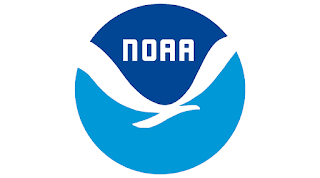The Sleeping Giant Stirs
When the movement to arrest global warming took hold the rationale was that, if we didn't reduce man-made greenhouse gas emissions, we risked crossing a tipping point that would trigger a natural feedback loop that could eclipse the damage humans have caused. Runaway global warming, especially the release of massive amounts of methane once safely sequestered in permafrost, tundra and seabed clathrates. It was depicted as a sleeping giant that must never be roused.
A new report from the US National Oceanic and Atmospheric Administration, NOAA, warns that a natural feedback loop has been triggered and we may have unleashed an uncontrollable source of global heating.
A methane feedback loop that is beyond humans' ability to control may have begun, scientists with the National Oceanic and Atmospheric Administration (NOAA) have said.According to the NOAA, methane is 25 times more powerful at trapping heat in the atmosphere compared to carbon dioxide. While it remains in the atmosphere for a much shorter time than carbon dioxide, it has a huge impact on the rate of climate change.
Fingerprints
Xin Lan, a research scientist at the NOAA, told Newsweek that after 2006, the majority of methane emissions produced were caused by natural wetlands and man-made emissions. Natural wetlands produce methane when organic matter decays , while and man-made emissions are caused by livestock, waste and landfills.
It's possible to distinguish man-made methane from natural source methane by carbon isotopes. The man-made stuff has more Carbon 13. Natural methane is mainly Carbon 12.
Nature Bats Last
Xin Lan, a research scientist at the NOAA, told Newsweek that after 2006, the majority of methane emissions produced were caused by natural wetlands and man-made emissions.
Lan said that because the Earth's climate is already warming the methane produced from natural wetlands is only set to increase. This signals the beginning of a feedback loop—an ongoing cycle that cannot be broken.
"From natural processes, we know that wetland methane emissions are sensitive to change in precipitation and temperature," she said. "Methane production from microbes increases with increases in global temperature which is driven by long-term greenhouse gas emissions. More atmospheric methane, in turn, can further warm up the earth. That's the feedback loop we are referring to."
What does this mean? Worst case scenario, let's not go there. Best case scenario - world leaders agree that the fossil economy must be put down, what Hans Joachim Schellnhuber described as an "induced implosion" and we explore last resort, "no other choice" measures, geo-engineering. Either we act or we go for the default option which is genuinely existential. Don't act surprised. We were always on that path, despite 26 consecutive COP climate summits. The party, it seems, is over.


Another gloomily accurate posting.
ReplyDeleteI first learned about the impending methane-caused catastrophe from a science fiction book that I read when it was published in 1994: 'Mother of Storms' by John Barnes.
It has plot devices that speed things up, of course but it taught me all about the real world threat of:
"The clathrate gun hypothesis is a proposed explanation for the periods of rapid warming during the Quaternary. The idea is that changes in fluxes in upper intermediate waters in the ocean caused temperature fluctuations that alternately accumulated and occasionally released methane clathrate"
I've been following the methane situation ever since and the 'Arctic BlogSpot' is a website with a collection of controversial methane theories that predict imminent doom.
Anyway, back to Barnes' wake-up call:
"It is 2028. A strike to destroy an illegal Arctic weapons cache has a catastrophic side effect. Massive amounts of energy are liberated from the polar ice, suddenly and radically warming the Earth's climate.
In the middle of the Pacific, a gigantic hurricane thousands of miles across is forming, larger than any in human history. A storm with winds of supersonic speed. A storm that changes direction at whim. A storm that refuses to die. A storm so vast it spawns dozens more in its wake.
Blinded by intrigue, expedience, and greed, the world's politicians and power brokers ignore the killer storm's threat until it's too late. The death toll climbs to the tens of millions as it savages the Pacific coast, and the smaller storms it spawns are wreaking havoc across the planet.
While the survivors scramble for advantage, a handful of courageous men and women undertake a desperate plan to save humanity from total destruction―a plan so visionary it may alter forever the future of the human race."
I have long feared that the day would come when we would begin to hear that we had left it too late and we lost without even trying. Here we are imagining "net zero" by 2050 even as GHG emissions continue to climb.
ReplyDeleteThe combination of self-interest and disparate circumstances makes meaningful cooperation between nations, essential to arresting climate change, extremely difficult to achieve. Those of us in the wealthier, latitudinally advantaged countries may make common cause among themselves but to the exclusion of the poorest and most vulnerable nations of tropical and equatorial regions.
Seats in the lifeboat will be allocated by invitation only.
"The combination of self-interest and disparate circumstances makes meaningful cooperation between nations, essential to arresting climate change, extremely difficult to achieve."
DeleteAnd just when some obvious tipping points are happening that might finally warp the narrative in favour of climate action, along comes a very convenient war to goose the war-industry, brand our fossil fuels as ethical and ensure that global cooperation remains a quaint aspiration.